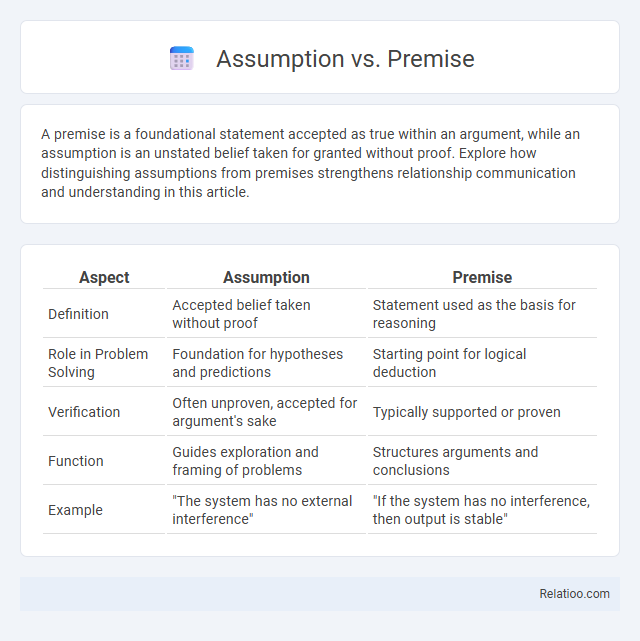A premise is a foundational statement accepted as true within an argument, while an assumption is an unstated belief taken for granted without proof. Explore how distinguishing assumptions from premises strengthens relationship communication and understanding in this article.
Table of Comparison
| Aspect | Assumption | Premise |
|---|---|---|
| Definition | Accepted belief taken without proof | Statement used as the basis for reasoning |
| Role in Problem Solving | Foundation for hypotheses and predictions | Starting point for logical deduction |
| Verification | Often unproven, accepted for argument's sake | Typically supported or proven |
| Function | Guides exploration and framing of problems | Structures arguments and conclusions |
| Example | "The system has no external interference" | "If the system has no interference, then output is stable" |
Understanding Assumptions and Premises
Assumptions are unstated beliefs or ideas accepted as true without proof, forming the foundation for reasoning, while premises are explicit statements or facts presented as evidence in an argument. Understanding assumptions involves identifying implicit ideas that influence conclusions, whereas analyzing premises requires evaluating the validity and relevance of stated claims. Differentiating between assumptions and premises enhances critical thinking and strengthens logical reasoning in debates and discussions.
Definition of Assumption
An assumption is a statement accepted as true without proof, serving as a foundational belief in reasoning or arguments. It differs from a premise, which is a specific proposition that supports a conclusion, while an assumption underlies premises and may remain unexamined. Understanding the role of assumptions helps clarify the basis of logical structures and critical thinking processes.
Definition of Premise
A premise is a foundational statement or proposition in an argument that supports the conclusion by providing evidence or reasoning. Assumptions are beliefs or ideas accepted without proof, often underlying premises but not explicitly stated. Understanding the definition of premise helps you critically evaluate arguments by distinguishing what is explicitly claimed from what is merely assumed.
Key Differences Between Assumption and Premise
Assumptions are unstated beliefs or ideas taken for granted without proof, while premises are explicit statements or propositions that form the foundation of an argument or reasoning. Your understanding improves by recognizing that premises serve as clear evidence supporting conclusions, whereas assumptions fill gaps by providing implicit context. Differentiating these terms is crucial for critical thinking and analyzing arguments accurately.
Role of Assumptions in Argumentation
Assumptions serve as foundational beliefs or statements taken for granted within argumentation, providing the underlying basis upon which premises are built. Premises are explicit propositions offered as evidence to support a conclusion, whereas assumptions remain unstated or implicit, often influencing the strength and validity of the argument indirectly. Effective argument analysis requires identifying and evaluating assumptions to assess whether conclusions logically follow from premises.
Function of Premises in Logical Reasoning
Premises serve as foundational statements in logical reasoning, providing the evidence or reasons that support the conclusion and ensure the argument's validity. Unlike assumptions, which are unstated beliefs taken for granted, premises are explicitly stated propositions used to build a logical framework. Their function is to establish a coherent basis on which sound arguments and deductive reasoning are constructed.
Examples of Assumption vs Premise
An assumption is an unstated belief accepted as true without proof, such as assuming someone is honest in a negotiation, while a premise is an explicit statement or fact forming the basis of an argument, like "All humans are mortal" in a logical deduction. Your understanding of these concepts improves by identifying that an assumption often underlies a premise, for example, assuming trustworthiness supports the premise that a partner will keep their word. Differentiating between assumptions and premises is crucial for analyzing arguments and avoiding logical fallacies.
Common Misconceptions
Common misconceptions often confuse assumptions, premises, and hypotheses as interchangeable terms, though each plays a distinct role in reasoning. Assumptions are unstated beliefs accepted without proof, while premises serve as explicit foundational statements supporting logical arguments. Hypotheses differ by being testable propositions subject to verification, highlighting that clarity in these definitions enhances critical thinking and argument analysis.
Importance in Critical Thinking
Assumptions, premises, and conclusions each play distinct roles in critical thinking, with assumptions serving as unstated beliefs that underpin reasoning and premises as explicit statements supporting conclusions. Recognizing and evaluating your assumptions is crucial for avoiding bias and ensuring sound judgment. Clear differentiation between these elements strengthens analytical skills and promotes more effective decision-making.
Application in Everyday Communication
In everyday communication, assumptions act as unstated beliefs influencing how messages are interpreted, while premises provide explicit foundational statements supporting arguments or conclusions. Understanding the distinction enhances clarity by ensuring that premises are clearly articulated and assumptions recognized to avoid misunderstandings. Effective communication relies on identifying and questioning assumptions and premises to foster more accurate and meaningful exchanges.

Infographic: Assumption vs Premise
 relatioo.com
relatioo.com